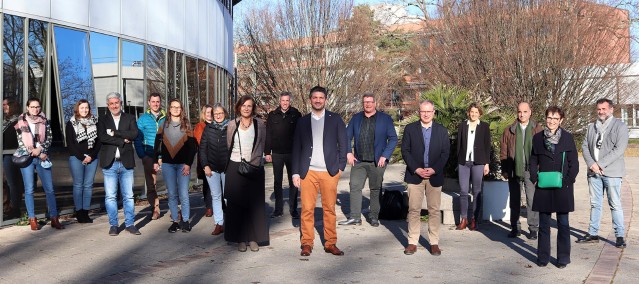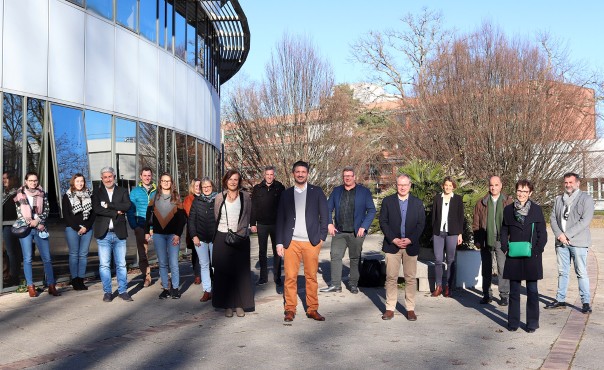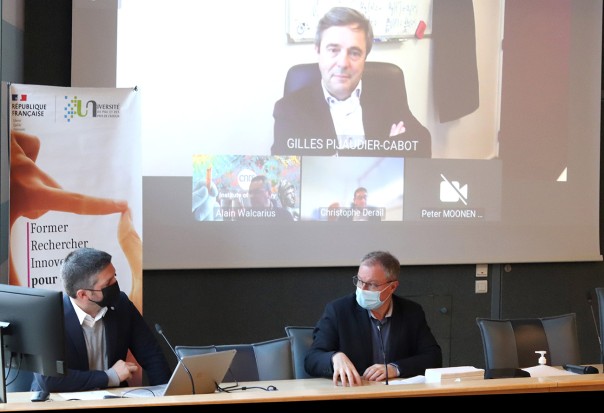Inauguration of ORHYON, the first ANR industrial chair at UPPA“Micro-Organisms and Hydrogen Reactivity in the Subsoil”

On January 25, 2022, the ORHYON chair was officially launched. This industrial chair is headed by Anthony Ranchou-Peyruse and co-financed by the French National Research Agency (ANR) and Engie, in collaboration with IFP Énergies Nouvelles. The chair will study the mobility and bio-geochemical reactivity of hydrogen in natural porous media, from deep underground to the surface. Jan Mertens, scientific director of Engie, came from Belgium to attend a full day of events.
The morning was dedicated to presentations of research projects of the University of Pau and Pays de l’Adour (UPPA), as well as to visits of technical platforms, related to energy and hydrogen.
First, geographer Xavier Arnauld de Sartre (TREE laboratory, TEEN research chair) spoke about the sociological notion of acceptability of new energies by the population and the need for local autorities to understand the difficulties they may face. Then the director of the LFCR, Guillaume Galliero, gave an overview of the laboratory’s research on natural hydrogen and hydrogen storage. Chemist Laurent Billon presented the interdisciplinary EnSuITe hub, which is dedicated to the production of hydrogen by artificial photosynthesis on the scale of the individual home. Finally, IPREM deputy director Cécile Courrèges summarized the research of the Raise 2024 hub, which focuses on improving solid-state batteries in partnership with Arkema and Saft.
Secondly, visits to technical platforms enabled participants to discover some of UPPA’s state-of-the-art equipment, machines that are quite rare at the national or even international level. Peter Moonen presented the X-ray tomographs hosted by DMEX (X-Ray Imaging Center) allowing the 3D reconstruction of samples, thus revealing their internal structures. The visit was an opportunity to discover the latest tomograph acquired by the center and which is one of only two in the world.
In the LaTEP technology hall, the RINGS reactor, the spearhead of a multidisciplinary project in partnership with the companies Storengy and Teréga, simulates the effect of the arrival of new gases in geological natural gas storage facilities, under conditions that mimic those of aquifers located at a depth of several hundred meters or even more than one kilometer.
The visits concluded at IPREM, where a “Tandem MS” secondary ion mass spectrometry (ToF-SIMS) analyzer, almost unique in France, was presented. This ultra-high vacuum surface characterization device allows the elementary and molecular identification of species present on the surface at submicron scales (traces), as well as their localization by 2D and 3D imaging. The applications are numerous, in particular in the field of batteries (analysis of electrode/electrolyte interfaces after operation).
On several occasions, the questions asked by the scientific director of Engie led to very interesting discussions.
“Fundamental and partnership research at the highest level”
In the early afternoon, during the official launch of the chair, UPPA President Laurent Bordes applauded the awarding of the university’s first ANR industrial chair. He also emphasized the importance of partnerships and interdisciplinarity to try to solve complex problems such as those of the energy transition. Finally, he indicated that no less than 30 of the university’s projects are related to hydrogen, and congratulated IPREM on its recent HCÉRES evaluation.
Gilles Pijaudier-Cabot, executive director of E2S UPPA, was delighted that large-scale research projects, such as this senior chair, can be carried out outside the framework of the I-Site and praised Anthony Ranchou-Peyruse for convincing the ANR and Engie. “This shows that we can do both fundamental and partnership research at the highest level to provide solutions together,” he said.
Anthony Ranchou-Peyruse then presented the ORHYON Chair (“Micro-Organisms and Reactivity of Hydrogen in the Subsoil”), in partnership with Engie for an amount of more than 1 million euros. The ORHYON Chair is a major project that brings together the complementary skills and expertise of some twenty researchers from UPPA, Engie and its subsidiaries, and IFP Énergies Nouvelles in a close and privileged collaboration.
ORHYON is a Geoscience project that combines several disciplines around the microbiology of deep environments, in order to better understand the behavior of hydrogen in the subsoil, from the depths to the surface. From this core objective, two practical goals follow, which are the possibility to evaluate methods for exploring sites of natural hydrogen production from geochemical mechanisms and to simulate the geological storage of large volumes of industrially produced hydrogen.
The results will lead to :
- a better understanding of the processes related to the migration and retention of hydrogen,
- new tools and methodologies to reduce the risks associated with geological storage,
- provide technical advice for its exploration and production.
Then Jan Mertens, Engie’s Chief Scientific Officer, shared three avenues of reflection in terms of research that should lead Engie towards carbon neutrality. Thus, Engie structures the activity of its 900 researchers around 23 thematic laboratories, including one dedicated to hydrogen. The scientific director concluded that natural hydrogen is a resource to be evaluated in Engie’s research policy.
Alain Walcarius, CNRS research director, Pierre Cézac, director of the ISIFoR Carnot Institute,* and Mohamed Amara, vice-president of the Pau Bearn Pyrenees authority in charge of High Education and Research. The latter assured the researchers of the “benevolent presence of the communities” at their side.
Finally, Isabelle Moretti, President of the ANR Industrial Chairs program, concluded the day by presenting the program, which celebrated its 10th anniversary in 2021. She emphasized that the ORHYON Chair holder was one of the youngest winners of this program.
She then recalled the four objectives of this call for projects:
- to enable the strategic development of research;
- to play an attractive and stable role for eminent professors-researchers as holders of industrial chairs;
- to create strong interactions with companies;
- to participate in training through research in connection with the territory and for a better integration of young people in the industrial environment.
Since its creation in 2012, this program has funded 40 industrial chairs, including 6 for New Aquitaine.
* The Carnot label is an official French label awarded to public research laboratories carrying out scientific research in public-private partnership. ISIFoR federates 11 research laboratories in the South-West of France in the field of energy and environmental issues related to the subsoil.
Bénédicte Lamothe - Direction de la communication / E2S UPPA
Read submission to ANR summary
Umbrella Organizations

Funders

Labels

First published on January 31, 2022

